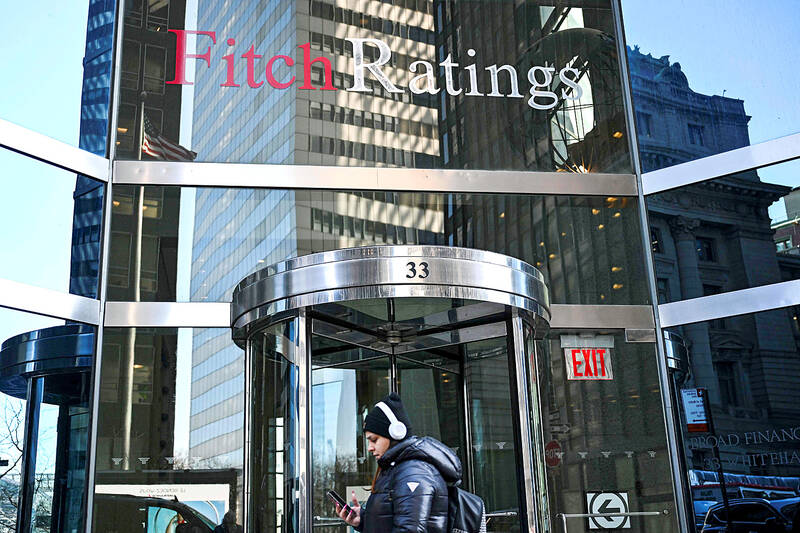Fitch Ratings yesterday said that it has placed Taiwan’s major life insurers on negative credit watch, citing concerns that the sharp appreciation of the New Taiwan dollar against the US dollar could undermine their financial strength, given their significant holdings of US dollar-denominated assets.
The “rating watch negative” designation reflects heightened risks to the insurers’ capital adequacy, earnings and overall business profiles, following the local currency’s abrupt 8 percent surge earlier this month, the international agency said.
The affected insurers are Cathay Life Insurance Co (國泰人壽), Fubon Life Insurance Co (富邦人壽), KGI Life Insurance Co (凱基人壽), Nan Shan Life Insurance Co (南山人壽) and Taiwan Life Insurance Co (台灣人壽), it said.

Photo: AFP
Foreign exchange hedging costs have soared, and the possibility of further appreciation remains, it said.
Taiwanese life insurers have invested a sizeable share of their NT dollar liabilities in US dollar assets, resulting in a substantial currency mismatch, it said.
“While life insurers have hedged a majority of their balance sheet mismatches, we believe this strategy will come under pressure due to the spike in hedging costs, while un-hedged positions continue to expose them to wild currency swings,” Fitch said.
While Fitch has not observed a surge in policy surrenders, it warned that such a scenario remains a potential risk to the insurers’ credit profiles.
The agency said it expects to resolve the negative credit watch within three to six months, after assessing the outlook for foreign exchange volatility, especially in the context of the current trade and economic conditions, as well as the insurers’ strategic responses, and corresponding changes in their capitalization and earnings profiles.
The insurers currently have sufficient capital buffers to absorb a 10 percent appreciation of the NT dollar against the US dollar without breaching downgrade thresholds, the agency said.
However, it cautioned that a moderate decline in capital ratios — if accompanied by continued NT dollar strength and markedly weaker earnings — could still trigger negative rating actions, it added.
“We expect the insurers to record significant losses due to the unfavorable currency movement ... Rising hedging costs and a more volatile NT dollar will also pressure their earnings,” it said.

Real estate agent and property developer JSL Construction & Development Co (愛山林) led the average compensation rankings among companies listed on the Taiwan Stock Exchange (TWSE) last year, while contract chipmaker Taiwan Semiconductor Manufacturing Co (TSMC, 台積電) finished 14th. JSL Construction paid its employees total average compensation of NT$4.78 million (US$159,701), down 13.5 percent from a year earlier, but still ahead of the most profitable listed tech giants, including TSMC, TWSE data showed. Last year, the average compensation (which includes salary, overtime, bonuses and allowances) paid by TSMC rose 21.6 percent to reach about NT$3.33 million, lifting its ranking by 10 notches

Popular vape brands such as Geek Bar might get more expensive in the US — if you can find them at all. Shipments of vapes from China to the US ground to a near halt last month from a year ago, official data showed, hit by US President Donald Trump’s tariffs and a crackdown on unauthorized e-cigarettes in the world’s biggest market for smoking alternatives. That includes Geek Bar, a brand of flavored vapes that is not authorized to sell in the US, but which had been widely available due to porous import controls. One retailer, who asked not to be named, because

SEASONAL WEAKNESS: The combined revenue of the top 10 foundries fell 5.4%, but rush orders and China’s subsidies partially offset slowing demand Taiwan Semiconductor Manufacturing Co (TSMC, 台積電) further solidified its dominance in the global wafer foundry business in the first quarter of this year, remaining far ahead of its closest rival, Samsung Electronics Co, TrendForce Corp (集邦科技) said yesterday. TSMC posted US$25.52 billion in sales in the January-to-March period, down 5 percent from the previous quarter, but its market share rose from 67.1 percent the previous quarter to 67.6 percent, TrendForce said in a report. While smartphone-related wafer shipments declined in the first quarter due to seasonal factors, solid demand for artificial intelligence (AI) and high-performance computing (HPC) devices and urgent TV-related orders

STILL LOADED: Last year’s richest person, Quanta Computer Inc chairman Barry Lam, dropped to second place despite an 8 percent increase in his wealth to US$12.6 billion Staff writer, with CNA Daniel Tsai (蔡明忠) and Richard Tsai (蔡明興), the brothers who run Fubon Group (富邦集團), topped the Forbes list of Taiwan’s 50 richest people this year, released on Wednesday in New York. The magazine said that a stronger New Taiwan dollar pushed the combined wealth of Taiwan’s 50 richest people up 13 percent, from US$174 billion to US$197 billion, with 36 of the people on the list seeing their wealth increase. That came as Taiwan’s economy grew 4.6 percent last year, its fastest pace in three years, driven by the strong performance of the semiconductor industry, the magazine said. The Tsai